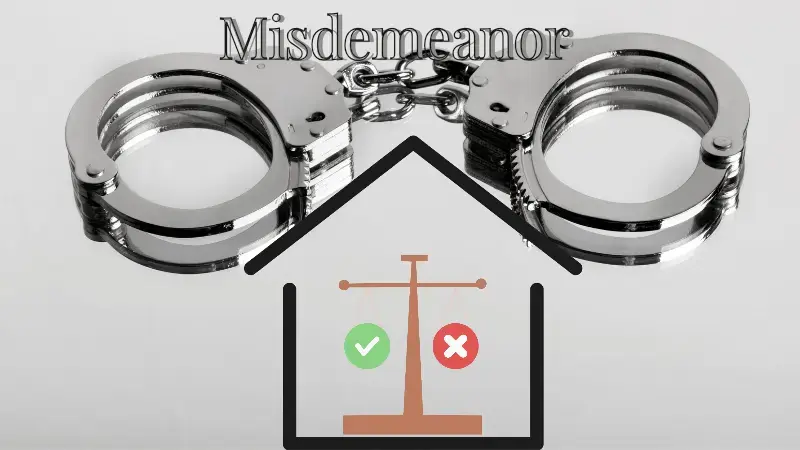First of all, people often ask questions like, can one be denied housing for a misdemeanor? And also reasons why. A proper explanation will be given in this post. A misdemeanor on your record can potentially lead to denial of housing. Landlords and property management companies often conduct background checks on prospective tenants, and they may consider factors like criminal history when making their decisions. However, the impact of a misdemeanor on your housing application can vary depending on factors such as the type of misdemeanor, local laws, and the specific policies of the landlord or property management company. It’s important to be honest about your criminal history when applying for housing, and you may want to discuss any concerns with the landlord to better understand their criteria for approval.
Can One Be Denied Housing For A Misdemeanor?

HUD, the U.S. Department of Housing and Urban Development, does not have specific guidelines that prevent individuals with misdemeanor convictions from obtaining housing assistance or participating in public housing programs. However, individual housing providers, including public housing authorities, may have their policies regarding the eligibility of individuals with misdemeanor convictions.
HUD guidance emphasizes that a criminal background is not an absolute barrier to obtaining housing assistance or participating in public housing programs. Housing authorities and providers are encouraged to consider the nature of the offense, the time that has passed since the conviction, and evidence of rehabilitation efforts when making eligibility determinations.
HUD has expressed concerns about broad exclusionary policies that automatically deny housing assistance to individuals based solely on their criminal history, as these policies disproportionately affect minority communities and individuals reentering society after serving time in prison. Instead, they encourage housing providers to use individualized assessments and consider a person’s post-conviction behavior and stability.
It is essential to note that individual housing providers may still have the right to deny housing to individuals with certain criminal backgrounds if they have legitimate safety concerns, especially if the offense is related to violent or drug-related activities. However, blanket exclusions based on misdemeanors alone would likely be viewed unfavorably by HUD.
Ultimately, while HUD does not have specific guidelines against housing for misdemeanors, policies regarding the eligibility of individuals with criminal backgrounds may vary among different housing providers, including public housing authorities.
Factors Why Your Housing Application May Be Rejected With A Misdemeanor.
Housing may be rejected to someone with a misdemeanor due to several reasons. Firstly, landlords and property management companies often conduct background checks on potential tenants to ensure the safety and well-being of the community. A misdemeanor on one’s record may raise concerns about the individual’s trustworthiness and ability to adhere to rules and regulations. Especially if the person falls into any of the categories listed below:
- Production or dealing with methamphetamine in a government-subsidized building.
- Registration on sex offender registry.
- Violent crime.
- Bully.
- Fraudulent Act.
Secondly, some housing providers have strict policies in place that prohibit renting to individuals with criminal records, including misdemeanors. These policies aim to maintain a certain standard of behavior and prevent any potential disruptions or conflicts within the community.
Lastly, housing discrimination laws may also play a role in denying housing to someone with a misdemeanor. While it is illegal to discriminate against individuals based on their criminal history, some landlords may still exercise caution and choose to deny housing to those with misdemeanors to avoid any potential legal complications. Overall, the denial of housing to someone with a misdemeanor is often based on concerns related to safety, community standards, and legal considerations.
HUD Housing Application Process
To apply for housing assistance through the U.S. Department
of Housing and Urban Development (HUD), you can follow these steps:
1. Check Eligibility:
Determine if you meet the eligibility criteria for HUD housing programs. Eligibility is often based on factors like income, family size, and citizenship status.
2. Contact the Public Housing Agency (PHA):
Reach out to the PHA to inquire about available programs and application procedures. You may be able to do this online, by phone, or in person.
3. Complete the Application:
Obtain and complete the HUD housing application provided by the PHA. You’ll need to provide detailed information about your household, income, and personal circumstances.
4. Gather Required Documents:
Prepare all necessary documents, such as proof of income, identification, and any other documentation requested by the PHA.
5. Submit Your Application:
Submit your completed application and all required documents to the PHA by the specified deadline. Some PHAs may offer online submission options.
6. Attend an Interview:
Depending on the program and the PHA’s policies, you may be required to attend an interview. Be prepared to discuss your application and provide additional information.
7. Wait for Notification:
After submitting your application and attending any necessary interviews, you’ll need to wait for the PHA to process your application. They will notify you of their decision.
8. Review Your Options:
If you are approved for housing assistance, you’ll receive information about available housing options. You can then choose the one that best suits your needs and preferences.
9. Complete the Lease Agreement:
Once you’ve selected a property, you’ll need to sign a lease agreement with the property owner or management company.
It’s important to note that the availability of housing assistance can vary by location, and there may be waiting lists due to high demand. Be patient and persistent in your application process, and make sure to follow up with the PHA as needed. Additionally, be honest and accurate in your application, as providing false information can lead to disqualification.
Can A Private Landlord Reject Those With A Misdemeanor?
We’ve previously discussed the rules governing low-income public housing and the Section 8 housing voucher program. Now, let’s explore the topic of private landlords. Can a misdemeanor on your record lead to a rental rejection? Is it legally permissible?
Private landlords have the legal authority to reject your rental application based on a misdemeanor listed on your criminal background report. Generally, any criminal history provides landlords with grounds for lawful discrimination when assessing rental applications.
However, it’s worth noting that private landlords are often more lenient with misdemeanor offenses compared to felony convictions. Some landlords may not even check for misdemeanors at all in their background searches.
When evaluating your background report, landlords primarily consider two key factors: the nature of the misdemeanor offense and the length of time that has passed since the incident. For instance, a misdemeanor for simple drug possession three to five years ago is typically of less concern to a landlord compared to a recent misdemeanor conviction for offenses such as simple assault or vandalism within the last year.
Final Thoughts

Public housing for individuals with misdemeanors can have both advantages and disadvantages. On the one hand, providing housing to people with misdemeanors can help reduce homelessness and recidivism rates by offering stability and support. It can also be seen as a step towards rehabilitation and reintegration into society.
However, there are concerns about safety and community well-being, as some argue that individuals with certain misdemeanor convictions may pose a risk to their neighbors. Striking a balance between providing housing opportunities and ensuring community safety is essential.
Ultimately, the effectiveness of public housing for those with misdemeanors depends on careful program design, support services, and community involvement. It’s essential to consider individual circumstances and rehabilitation efforts when making decisions in this context.